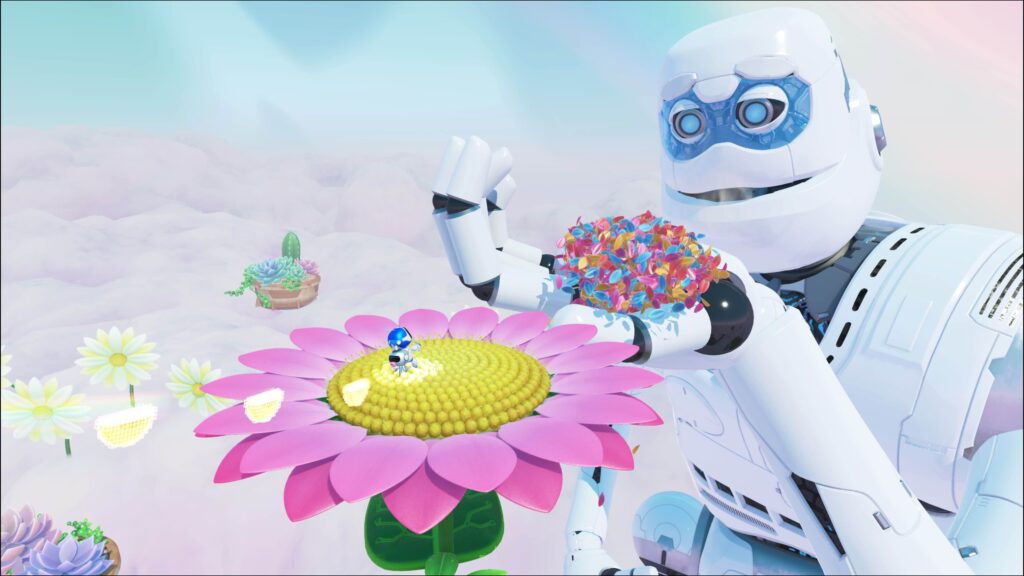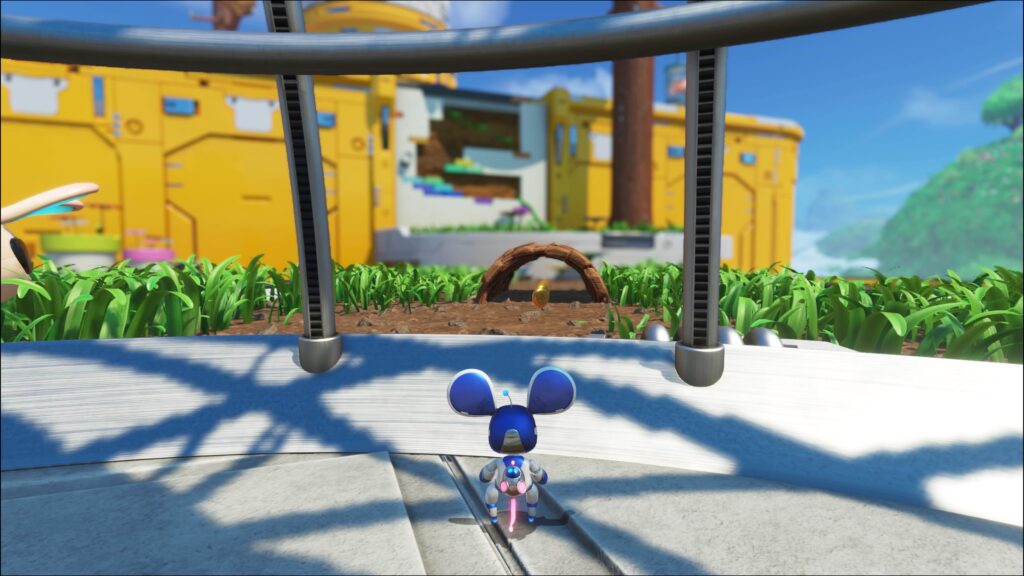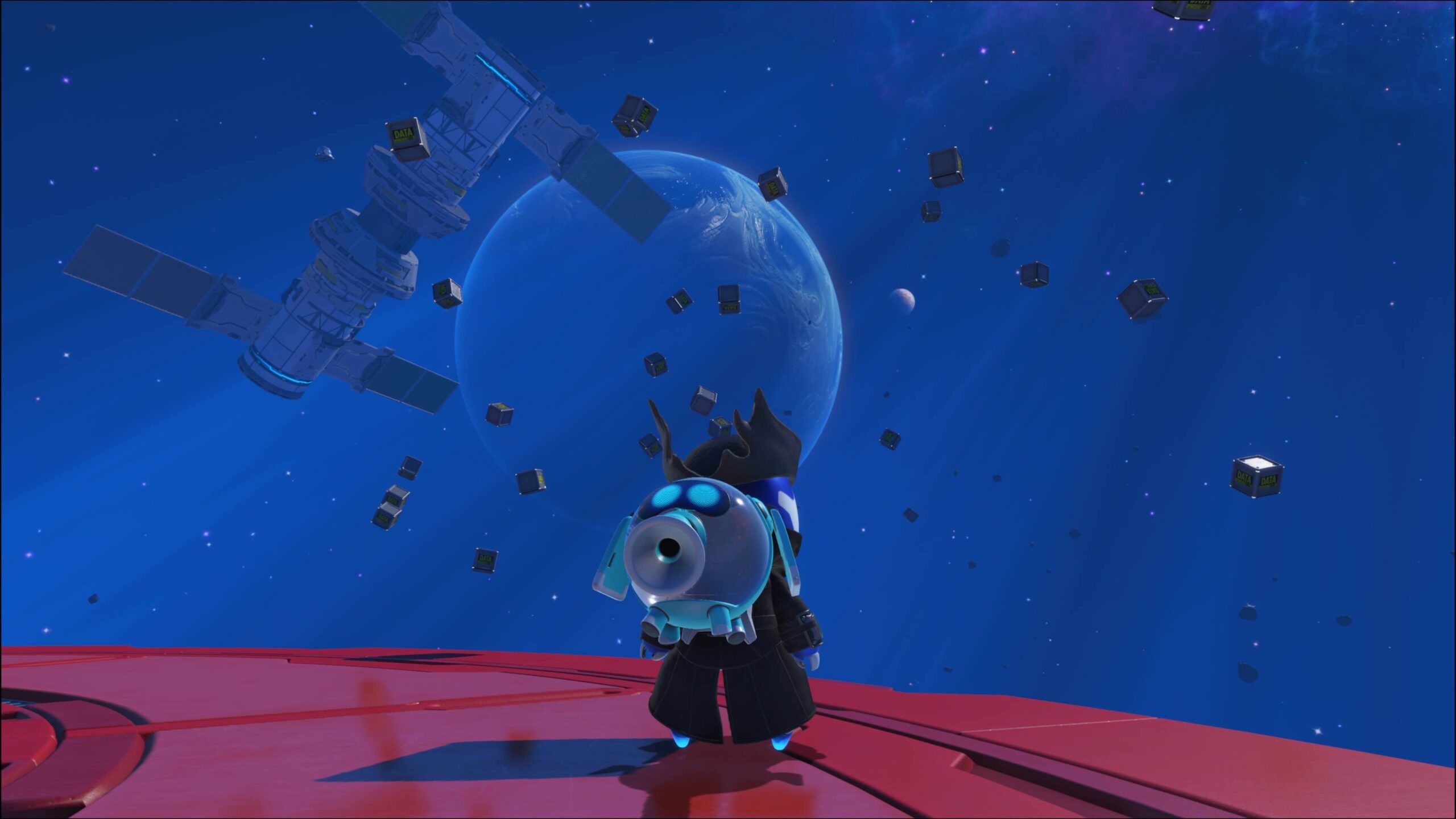Make no mistake: Astro Bot is a great game. For all of its depressing reminders, tone-deaf celebrations, and strange attempts to venerate a console whose legacy will seemingly amount to how little there is to play on it (except Astro Bot), there is a spectacular piece of joy here; mind you, spectacular pieces of joy aren’t typically known to inculcate a sense that everything to do with the future has been cancelled, but even God wasn’t quite perfect.
On a less funereal note, I’ve been bothered by persistent comparisons between Astro Bot and Super Mario Galaxy, including folks going as far as to call Astro Bot a truly Galaxy-esque game. I’ve seen it said that it has everything from “similar vibes” to the makings of a “successor.” It’s easy to see why someone would think this, especially considering the base elements at play: little areas suspended over a ceaseless void, spinning move, a Magnetic Rose evoking haunted mansion planetoid that raises eerie questions about the configuration of the universe. Presentationally, it’s very Galaxy. The inspiration is doubtlessly there.
At the same time, I can’t take the notion that Astro Bot is a meaningful Galaxy follow-up seriously. Comparisons have only served to highlight the gulf in substance between them; the modes of expression we’ve shirked, evinced by the difference in emotional texture between two games with a similar framework and completely different desires.

Galaxy, like Astro Bot, is a very fun platformer. However, when I think about Galaxy, the moment to moment stuff that makes a platformer fun feels fairly insignificant. It’s there and it’s important, but I don’t care to rhapsodize about it. Rather, those things – the feedback each action provides, the vibratory spin, how good it feels to jump and vault across everything – all seem like a means to an end. It’s just the raw glue that facilitates what Galaxy really feels like, which is a loose cataloging of environments, obstacles, and aural experiences bent purely towards the construction of emotional architecture.
Galaxy is a conventional thing in unconventional skin: a game that really strived to bring about a spectrum of textured feelings ranging from exuberant happiness to distant melancholy; a game about joy allowing itself to be interspersed with furtive, sudden glimpses at the lonely expanse of an infinite universe. For every Good Egg or Gusty Garden Galaxy, there was something waiting to stir the brain of an unsuspecting player. Only in Galaxy could a stage about mixing fire and ice sound like this.

There are so many things that I’ve always loved about Galaxy, but few things remain so potent as its ability to sneak into your imagination. I find myself particularly drawn to the ways in which it strings together disparate emotions through discontinuous space. Planetoids meld together, attached by sensation alone. When they take a more coherent shape, it’s easy to see how a single stage in Galaxy can work you into one mood only to steadily shift you into another. I’m enraptured by the sense of place some of its galaxies convey; how you start Deep Dark on a cozy beach only to leave it behind and descend into the haunted caves below, or how easily you ascribe your own imaginings to the unremarked, somehow lonely structures dotted across Sea Slide.
The essential quiddity of these stages was their ability to contain things that seemed so much bigger than what Galaxy actually was, from the skyboxes to the environments themselves. Remember when games like this had a first-person mode? It had no practical “use” I can recall, save for staring ahead and admiring the scenery. In a game like Galaxy, however, it typically drew a player’s eyes up: at distant portions of the stage, at planets in the skybox you could never reach, at quite literally everything. Those quiet moments of pure and curious wonder could stop your momentum even when you least anticipated it – staring into space, wondering what might be out there.

All of this is to say that Galaxy feeds the imagination: sometimes fast and wondrous, sometimes slow and contemplative, sometimes celebratory, sometimes creepy, often indescribable but always breathtaking. And Astro Bot is… well, it’s fun. It’s really fun! In fact, it’s always fun. That’s kinda the problem.
Astro Bot is like a sugar rush that never ends. Every step is mind-numbingly satisfying, every area is gorgeous, every moment is laced with pure and unadulterated joy. It’s such an unregulated Good Time that it literally does not have room to be anything else. At no point in Astro Bot did I stop dancing and leaping to think about anything other than my own enjoyment of the game. There wasn’t the slightest tinge in my imagination as the perpetually boppy music kept me smiling and running through every environment; sand and snow tickled my brain without ever relaying a sensation of heat or chilly air; nothing in the sky spoke to me, or if it did, I couldn’t hear it over the cacophony of glee that rung out in response to my every input. It didn’t matter where I was or what I was looking at, because it was all so fun that perception itself became ancillary to every moment of raw, choking delight.
Astro Bot is only deceptively calm and never quiet. It has one emotional register, one tone – it is fun. It has haptic feedback, hundreds of Jiggies to collect, and includes consequence-free gambling. It is a shot of undiluted dopamine that threatens to entirely overcome your conscious mind. It’s hard not to miss the fleeting nature of its pack-in precursor, which was short enough to leave you wanting more. Now that I have it, I feel like further exposure is medically inadvisable.

Everyone adores the level with the shrinking gimmick, which I suspect has something to do with the nature of shrinking itself: how it forces us to reconsider space and observe a change simply by changing the way we perceive our environment. It’s the only level in Astro Bot that encourages you to stand in place and just stare, not to discover a collectible or a way forward, nor to look at anything in particular, but purely to find something deeper within the image; perhaps to even look beyond it.
Games can be different, and Astro Bot doesn’t need to be like some other thing. One of the worst critical sins is to decry a work of art for not being something that it fundamentally wasn’t to begin with. Rather, I take umbrage with precisely how much of Astro Bot is a disservice to its own whimsy: a never-ending party that celebrates Astro Bot, which is a celebration of Astro Bot. The problem with parties is that all of them terminate in exhaustion, which is a concept that games like Galaxy comprehend. There have to be interstices where the party takes a backseat, and literally anything can occupy that space so long as it isn’t more partying.
Can Astro Bot stop jockeying for my attention? It’s fine, I’m not going anywhere. Would it kill Astro Bot to slow down for three seconds? Would the experience they’d crafted be ruined by allowing me to perform an action that isn’t heralded by sixty physics objects enthusiastically tumbling to the ground every time? They might not even need to change anything else; I might find a softer quality that’s already there, somewhere behind the growing pile of streamers and wrapping paper. All I want from any game is expression, resonance, discordance, flavor, anything. Here, there’s one expression and nothing but more candy – it’s Birthday Cake Flavor, The Game.
This isn’t even gesturing towards that perennial argument about the value of friction in a work of art. Not everything is Pathologic, and that’s okay. Rather, it’s about this maximal idea of fun as an all-consuming force in a game that occupies every crack and crevice before the slightest conflicting emotion can take route. Fun as singular, rather than fun as part of a manifold.
There’s a reason you’re told to take everything in moderation: if you tried to eat ice cream for breakfast every morning, not only would your body eventually relent from the lack of actual nutrition, but it would just stop feeling like anything. Experiences like that are only meaningful because they’re special, and they’re only special if they aren’t happening all the time. Everyone wants to feel good, but feeling anything other than good isn’t bad. If you never had to walk through a storm, home would feel so much less cozy. And you learn to appreciate that walk in the storm, too. After all, it doesn’t happen every day, and our best thoughts tend to occur in the rain.
I liked Astro Bot, but I loved Galaxy more. For all the ways in which the former is a gratifying step in the right direction for AAA production, it’s only deepened a trench I’d sooner spend less time in. Like ice cream, I prefer it as a treat. I’d much rather spend the bulk of my day staring into the stars.

